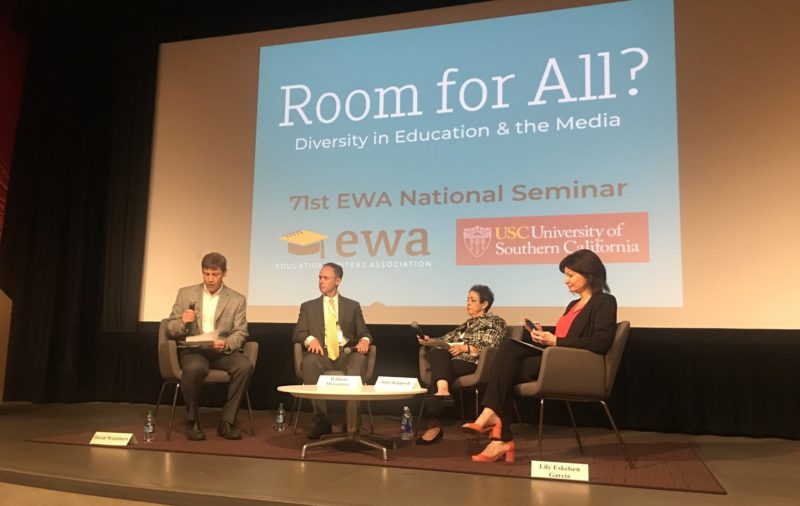 (AP Photo/Sue Ogrocki)
(AP Photo/Sue Ogrocki)
With the U.S. Supreme Court only weeks, perhaps days, away from issuing a potentially momentous decision in Janus v. AFSCME, what will the fallout be for unions, educators and schools? That was the question before a panel at the 2018 Education Writers Association National Seminar in Los Angeles on May 16.
The panel, moderated by journalist David Washburn of EdSource, featured Lily Eskelsen Garcia, president of the National Education Association, William Messenger, staff attorney for the National Right to Work Legal Defense Foundation, and Julia Koppich, president of J. Koppich & Associates, a San Francisco-based education consulting firm.
The issue before the Court in Janus is whether government employees who are covered by and benefit from a union contract, though not members of the union, should have to contribute to the union’s costs - by paying an agency or fair share fee for their share of those costs - that support strong public sector collective bargaining. The petitioner argues that the First Amendment prohibits fair share fees. If the Court agrees, the rights and freedoms of working people to join together in strong unions will be significantly weakened.
Pressed by moderator Washburn about the actual agenda behind the Janus case ("Is this not just window dressing for union-busting?"), Messenger insisted that the only pertinent issue is the "freedom" to choose whether or not to be in a union. As far as whether or not unions lose members, and the impact on schools, "This is about choice only and I don't see the connection," said Messenger. "The case is a few degrees removed from any of those issues."
Julia Koppich suggested to the audience that anyone who believed Janus was merely about the First Amendment was indulging in "magical thinking."
"It's important that we understand the malign intent behind Janus," Koppich said, namely to severely reduce the bargaining power of public sector unions.
The case is bankrolled by the National Right to Work Foundation, Messenger's employer, an is part of a well-funded network of corporate billionaires to use the courts to rig the rules against working people.
Eskelsen García told the reporters that NEA has only around 90,000 feepayers members out of 3 million. "I don't think the National Right to Work Foundation will be satisfied with just that."
It wouldn't, she added, because "the case is just a pretext to get union members to drop their membership."
Eskelsen García also pointed out that groups behind Janus already have launched aggressive drop campaigns seeking to persuade current union members to drop their membership and enjoy the benefits of membership on the dues paid by others. This exposes the true intent behind the case: divide and limit union members’ collective bargaining power and take away the rights and freedom of working people to speak up for themselves and their communities.
"They want to keep the megaphone as small as possible," she said. "This is about silencing voices."
If the Court rules for the plaintiff, Washburn asked, how will unions change how they organize and engage. There's no question that NEA and others will have to open "a new chapter," said Koppich. "We don't know yet what the impact will be on membership but unions will have to be creatively nimble moving forward. I do worry, however, that collaborative relationships in schools districts will be undermined. That can happen when fairness and due process, once embedded in the system, is no longer there."
Eskelsen Garca agreed that the Janus case could make NEA significantly adjust. “We have to become more and more relevant. What we are doing has to touch the heart and minds of members and potential members. But it's already happening."
 NEA President Lily Eskelsen García (far right) discusses the potential ramifications of Janus v. AFSCME at the 2018 Education Writers Association National Seminar on May 16.
NEA President Lily Eskelsen García (far right) discusses the potential ramifications of Janus v. AFSCME at the 2018 Education Writers Association National Seminar on May 16.
Support for labor unions has risen to its highest level in years and millions of American workers have recommitted to their unions and launched new organizing drives.
"Everyone is looking at what is happening across the country and are saying 'listen to the teachers.' "
Koppich agreed. "Parents see teachers as being unfairly treated," and schools underfunded.
Through their union, educators in West Virginia, Oklahoma, Kentucky, Colorado, Arizona and North Carolina have been speaking up and advocating for their students. They are speaking out against broken chairs, outdated textbooks that are duct taped together, mold on the ceilings, classrooms with more students than desks, and four-day school weeks.
As Eskelsen García told the journalists in the room, educators in Arizona were quick to reject Gov. Dave Ducey's initial proposal to end the walkout because it focused on their salaries, not on reversing the chronic underfunding that has plagued the state's schools.
These red state walkouts, in states without fair share fees many of which have no or very limited state bargaining rights, show the power of educators and their unions as advocates for students, Eskelsen Garcia said.
The question for the Court is whether it would rather see the power of those unions at the bargaining table in a controlled form or in the streets of state capitols.
Regardless of the decision, however, "educators are awake. There will be a new chapter," said Eskelsen García.
"We're seeing a greater level of activity now that we ever have before. But we still have to have one-on-one conversations with every educator. They need to know how we can help. The collective voice is all we have...and we're not going anywhere."








